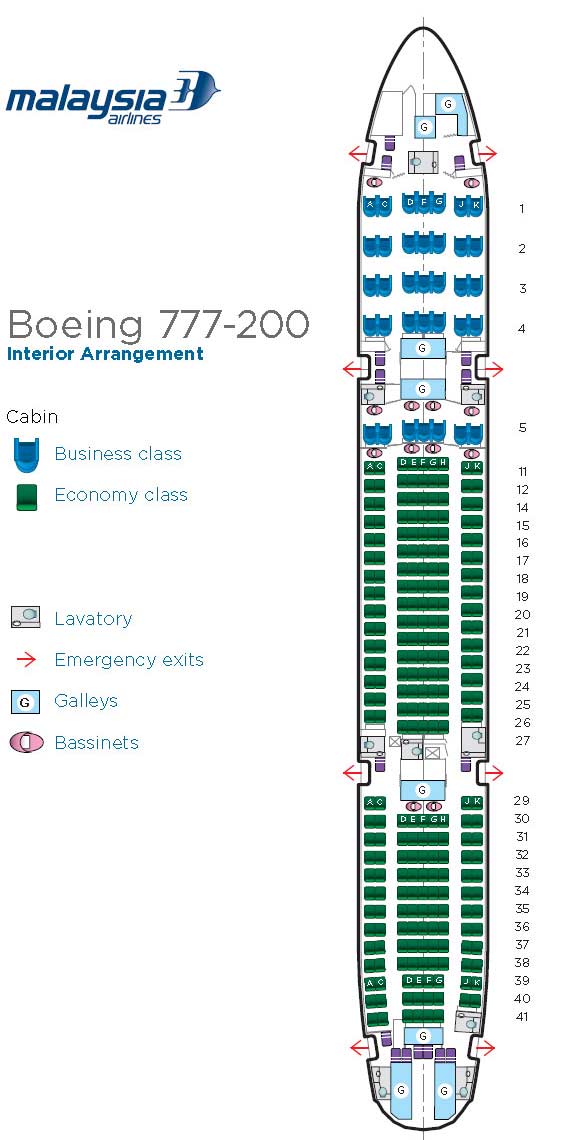Jet 'ended in ocean,' China asks for all info
 0 Comment(s)
0 Comment(s) Print
Print E-mail Xinhua, March 25, 2014
E-mail Xinhua, March 25, 2014

Boeing's wide-body 777 was originally conceived as a stretched 767, but the company instead adopted an all new design.
Notable 777 features include a unique fuselage cross section, Boeing's first application of fly-by-wire, an advanced technology glass flight deck with five liquid crystal displays, comparatively large scale use of composites (10 percent by weight), and advanced and extremely powerful engines.
The 777 was also offered with optional folding wings where the outer 6m/21ft of each would fold upwards for operations at space restricted airports.
The basic 777-200, launched in October 1990, was offered in two versions, the basic 777-200 (initially A-Market) and the increased weight, longer range 777-200IGW (Increased Gross Weight, initially B-Market). The IGW has since been redesignated 777-200ER.
The 777-200 first flew on June 12, 1994, with Federal Aviation Administration and Joint Aviation Authorities certification awarded on April, 19 1995. The FAA awarded full 180 minutes Extended range Twin Operations clearance for PW4074 -200s on May 30 that year. The first customer delivery was to United Airlines in May 1995. The first 777-200IGW/ER was delivered to British Airways in February 1997. (airliners.net)
777-200/777-200ER technical characteristics:
|
Models |
777-200 |
777-200ER |
|
Passengers |
||
|
Typical 3-class configuration Typical 2-class configuration Typical 1-class configuration |
305 400 up to 440 |
301 400 up to 440 |
|
Cargo |
Total volume 5,330 cu ft (151 cu m) includes up to six pallets, 14 LD-3 containers, plus 600 cu ft (17 cu m) bulk cargo. |
same |
|
Engines maximum thrust |
Pratt & Whitney 4077 77,000 lb Rolls-Royce Trent 877 76,000 lb General Electric GE90-77B 77,000 lb |
Pratt & Whitney 4090 90,000 lb Rolls-Royce Trent 895 93,400 lb General Electric 90-94B 93,700 lb |
|
Maximum Fuel Capacity |
31,000 US gal (117,340 L) |
45,220 US gal (171,170 L) |
|
Maximum Takeoff Weight |
545,000 lbs (247,200 kg) |
656,000 lbs (297,550 kg) |
|
Maximum Range |
5,240 nautical miles (9,700 km) Typical city pairs: London - New York Denver - Honolulu Tokyo - San Francisco |
7,725 nautical miles (14,305 km) Typical city pairs: London - Los Angeles Tokyo - Sydney Chicago - Seoul |
|
Typical Cruise Speed at 35,000 feet |
0.84 Mach |
Same |
|
Basic Dimensions |
||
|
Wing Span Overall Length Tail Height Interior Cabin Width Diameter |
199 ft 11 in (60.9 m) 209 ft 1 in (63.7 m) 60 ft 9 in (18.5 m) 19 ft 3 in (5.86 m) 20 ft 4 in (6.19 m) |
199 ft 11 in (60.9 m) 209 ft 1 in (63.7 m) 60 ft 9 in (18.5 m) 19 ft 3 in (5.86 m) 20 ft 4 in (6.19 m) |





